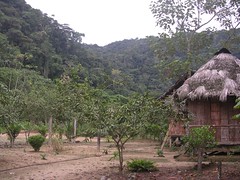One of the most adventurous ways to travel from Ecuador towards the Peruvian Amazonian rain forest is to cruise along the Rio Napo, embarking on the cargo boats that follow the route Coca (Equador) – Iquitos (Peru). We have been attracted by this adventure for a long time, but the extreme uncertainty on delays and distances, has forced us to renounce. This is the information we have collected, hoping it can be useful for other travellers. Coca is situated in the North-Eastern region of Ecuador and there are three ways to go there:
- Quito-Coca, 12 hours of direct bus.
- Quito-Tena-Coca, with a stop in Tena (rafting, canyoning, kayaking, ecotourism in the Amazonian forest).
- Quito-Baños-Tena-Coca, with a stop in Baños for trekking and thermal baths.
Coca, a rainy city born as base for the explorations of the oil companies, it’s the place where all the roads end, the travel continuous on the cargo boats along the Rio Napo: near the port of Coca you will look for a boat going to Nuevo Rocafuerte, officially supposed to leave on Mondays and Thursdays, but there could be others. Meantime, it’s necessary to get your passport stamped at the immigration office (the last one before Ecuadorian border). The travel until Nuevo Rocafuerte lasts approximately 12 hours, but could be interesting to program a stop along the way (Limoncocha for example): it’s one of the wildest zones of the Amazon, for a long time the Rio Napo borders the Yasunì National Park, where Huaorani, Tagaeri, Achuar and Siona isolated indigenous groups still live. We advise to contact a local guide before your arrival. From Nuevo Rocafuerte, you should find a canoe to Pantoja, the first village in Peruvian territory, where it’s possible to get your passport stamped. From Pantoja the hardest part of the travel begins: four or five consecutive days by boat, until the city of Masan, from where other travelers suggest to take a moto-taxi to a port of fast lanchas (canoes) directed to Iquitos, in order to save 13 hours of boat trip.
Probably a long and debilitating travel, to be undertaken with a lot of calm in order to know a wonderful part of Amazonian forest, surely an adventure.
